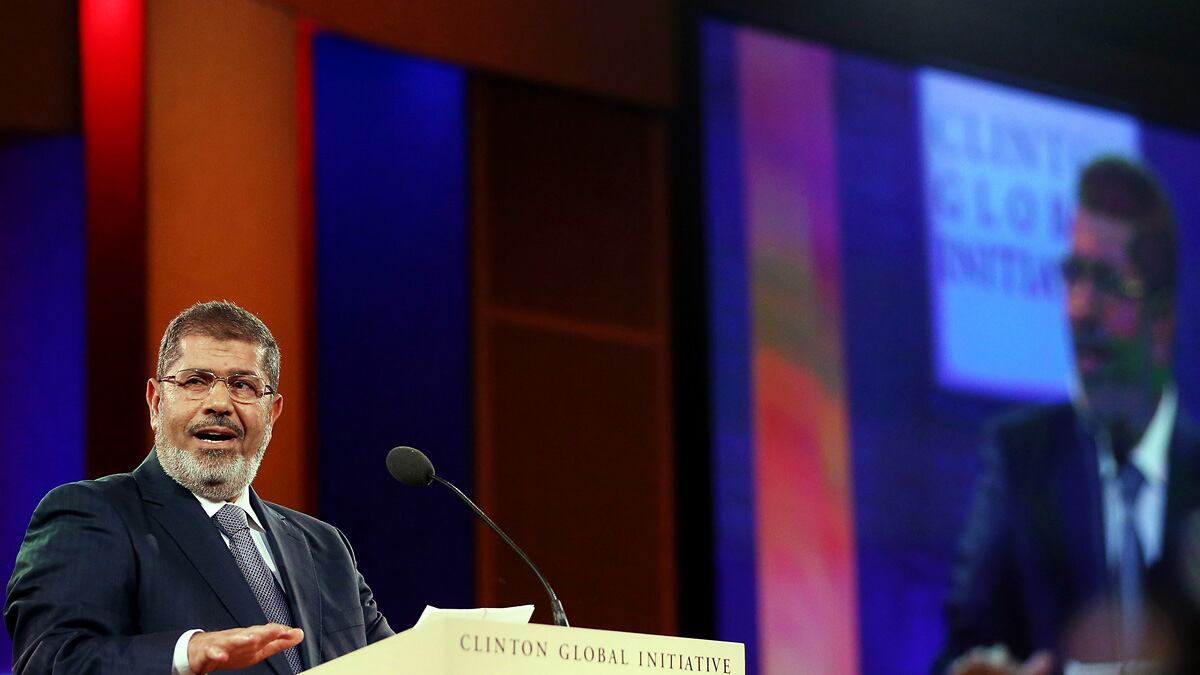It certainly wasn’t an apology.

In Mohamed Morsi’s first U.S. appearance since his June election as Egypt’s president, he took the stage at the Clinton Global Initiative to defend his nation’s transition toward democracy and to demand international help.
“We need assistance—investment, technology, international cooperation,” Morsi told former president Bill Clinton and a near-capacity crowd at the closing session of the summit. “The situation in Egypt is stable. We are ready for tourism and investment.”
A former head of the Muslim Brotherhood, Morsi is Egypt’s first democratically elected president. Since taking office, the 61-year-old has consolidated power by firing many of the nation’s most powerful military leaders and claiming broad executive powers. In recent weeks, Morsi faced Western criticism for failing to deal forcefully with violent anti-American protests, including the storming of the U.S. Embassy in Cairo.
Just days before arriving in New York for the Clinton Global Initiative and to speak at the U.N. General Assembly, Morsi told The New York Times that the onus is on Washington to repair relations with the Arab world and to revitalize the alliance with Egypt.
The interview stunned some observers, among them David Frum, who noted that it seemed audacious for Morsi to announce “preconditions for accepting the $2 billion in annual American aid he needs to save his country from plunging even deeper into crisis.”
At the Clinton summit on Tuesday afternoon, Morsi, who will address the General Assembly on Wednesday morning, said Egypt and the Middle East are at “a critical juncture.” Speaking in English, he called Egyptians the “ultimate guarantors” of his country’s transition, but declared that “we will also turn to our friends and partners beyond our borders.”
Morsi’s remarks met with polite applause from a near capacity audience that included Chelsea Clinton, Barbra Streisand, Geena Davis, and will.i.am.
Morsi directly addressed recent violent demonstrations in Egypt and elsewhere that are widely blamed on a U.S.-made film that denigrated the Prophet Muhammad. The president, who delayed his initial response to the protests a full day before calling on the U.S. to prosecute the filmmakers, on Tuesday suggested that unfettered freedom of expression was at fault.
“Demonstrations broke out in a number of Arab countries. This episode requires some reflection,” Morsi said. “Freedom of expression comes with responsibilities, especially when it comes with serious implications for peace. “
In his remarks, Morsi also repeatedly warned Western nations against seeking to dominate his region. “The world is not uni-cultural. We must live together rather than seeking to dominate each other. The people in the world cannot accept domination anymore.”
And he laid the blame for some of the issues in the Middle East on Western economics. “We cannot survive side by side with extreme poverty and oppression,” he said. “We cannot ignore the disparity between the haves and have-nots. We cannot ignore policies that lead to poverty and violence. We cannot ignore practices that are destroying our planet.
“Like many I cannot watch the bloodshed in Syria and the children in Gaza and claim our [global] governance works. The revolutions of the Arab Spring happened because people realized they were the power.”
At the close of his question-and-answer session with Clinton, Morsi extended a hand. The “new Egypt” is not “theocratic,” he declared. “It is non-militant. The glass is half full.”






